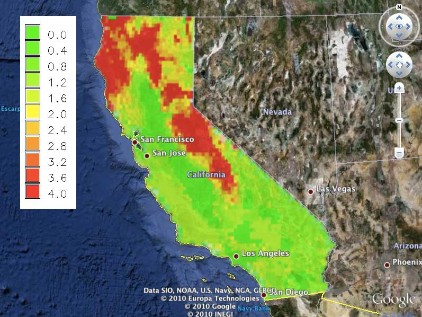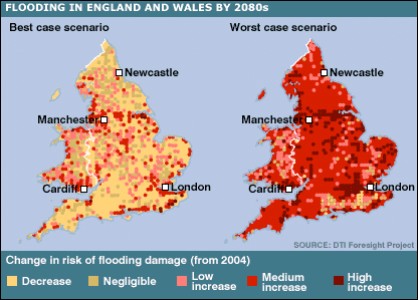Global Warming Climate Change Forecasts - 2080
Climate Refugees | Global Warming Migration
2080. Global warming projected to cause a mass migration of Mexicans to the U.S. by 2080 as a result of reduced crop yields in Mexico. “[S]cientists are predicting another consequence of climate change: mass migration to the United States. Between 1.4 million and 6.7 million Mexicans could migrate to the U.S. by 2080 as climate change reduces crop yields and agricultural production in Mexico, according to a study [Linkages among climate change, crop yields and Mexico–US cross-border migration] published online this week in the Proceedings of the National Academy of Sciences. The number could amount to 10% of the current population of Mexicans ages 15 to 65.
‘Assuming that the climate projections are correct, gradually over the next several decades heading toward the end of the century, [climate change] becomes one of the more important factors in driving Mexicans across the border, all other things being equal,’ said study author Michael Oppenheimer, professor of geosciences and international affairs at Princeton University.”
(Anna Gorman, anna.gorman@latimes.com, Los Angeles Times, “Climate change linked to possible mass Mexican migration to U.S. - Lower crop yields and agricultural production could drive as many as 6.7 million across the border by 2080, a study finds,” Los Angeles Times, July 26, 2010 citing findings in Shuaizhang Feng, Alan B. Krueger, and Michael Oppenheimer, "Linkages among climate change, crop yields and Mexico–US cross-border migration," Proceedings of the National Academy of Sciences, Published online before print July 26, 2010, doi: 10.1073/pnas.1002632107)
2080. By 2080 global warming could induce 1.4 to 6.7 million Mexicans to emigrate to the U.S. in search of work. “Global warming could drive millions more Mexicans into the United States in search of work by 2080 because of diminishing crop yields in Mexico, a study [Linkages among climate change, crop yields and Mexico–US cross-border migration] released Monday [July 26, 2010] showed. ‘Depending on the warming scenarios used and adaptation levels assumed... climate change is estimated to induce 1.4 to 6.7 million adult Mexicans (or two percent to 10 percent of the current population aged 15-65 years) to emigrate as a result of declines in agricultural productivity alone,’ the study said. Researchers led by Michael Oppenheimer of the Woodrow Wilson School of Public and International Affairs at Princeton University estimated the sensitivity of migration to climate change and predicted the number of Mexicans who would migrate under a range of different climate and crop yield scenarios.
The worst-case scenario would occur if temperatures were to rise by 1.8 to 5.4 degrees Fahrenheit by 2080, if farming methods had not been adapted to cope with global warming and if higher levels of atmospheric carbon dioxide had not spurred plant growth. This would mean crop yields in Mexico would fall by 39 to 48 percent, the study said. ‘In that case, the increase in Mexico's emigration as a share of population would be between 7.8 percent and 9.6 percent,’ said the study, which was published in the Proceedings of the National Academy of Sciences. ‘Using today's population of 70 million as the base for the age 15-65 year population in Mexico, this percentage increase corresponds to an additional 5.5 to 6.7 million emigrants,’ it said.” (“Climate change could spur increased Mexican migration to US,” Agence France-Presse, MNN Mother Nature Network, Monday, July 26, 2010 citing findings in Shuaizhang Feng, Alan B. Krueger, and Michael Oppenheimer, "Linkages among climate change, crop yields and Mexico–US cross-border migration," Proceedings of the National Academy of Sciences, Published online before print July 26, 2010, doi: 10.1073/pnas.1002632107)
Fire - Global Warming | Wildfires Climate Change
Potential for Wildfires in California in 2085
2085. Predicted wildfire frequency in California in 2085.
"The University of California at Merced prepared a study estimating how
climate change may alter the frequency of large wildfires in
California. The example [above] shows the potential for wildfires in
2085 as predicted by the GFDL climate projection model under the A2
emissions scenario. The scale shows areas affected by different
frequencies of wildfires under a climate change scenario by the end of
this century. For example, 4.0 means the danger of wildfires would be
four times more than in the historical period." (California Climate Change Portal, "Potential Changes in Wildfire Regimes in California," Climate Change Policy & Climate Action Team, Sacramento, California, last modified December 3, 2009)
Climate Change Floods | Global Warming Flooding
2080. By 2080 100 million people worldwide could be flooded each year by rising sea levels. “Even more disturbing news came in a separate study conducted by the Intergovernmental Panel on Climate Change, reporting that ‘coastlines are already showing the impact of sea-level rise.’ The draft copy, obtained by the Associated Press, said about 100 million people each year could be flooded by rising seas by 2080.” (Maya Grinberg, “That sinking feeling,” Risk Management, August 1, 2007 citing IPCC WGII AR4 Fourth Assessment Report - Draft for Government and Expert Review, Chapter 14 - North America, Intergovernmental Panel on Climate Change, July 21, 2006, p. 39)
2080. Severe once-in-a-century floods projected to strike England and Wales every three years by 2080. “Severe floods on a scale previously seen once every century could strike England and Wales every three years by 2080, a government study of the impact of global warming says. London, the Solent,
north Norfolk and other coastal areas will become 30 times more
vulnerable to devastating wave surges, raising the annual economic costs
of flooding from £1 billion to more than £20 billion, according to
scientists’ worst-case scenario. The danger of flooding from swollen
rivers and more intense and frequent storms will rise by between four
and six times, and the number of people whose homes are at high risk
will more than double to 3.46 million. Even under the most positive
scenario, in which the world takes substantial steps to hold back
climate change, the impact on Britain will be great. The flood risk will
rise by at least 30 per cent around the Thames and Severn estuaries, the Wash, Portsmouth and the Sussex coast, and the annual cost of flooding will reach £4.8 billion, with 2.4 million people in high risk flood plains.
The bleak picture has emerged from the Foresight Flood and Coastal Defence Project,
a £1 million study involving 40 researchers and the most sophisticated
computer models of the British climate and coastline ever developed.
The project, run by the Government’s Office of Science and Technology,
is the first of its kind in the world. While previous models have
predicted temperature and sea-level change, Foresight also uses input
from economists and sociologists to build a much more complete picture
of the long-term effects of global warming.” (Mark Henderson, Science Correspondent, "Britain ‘is heading for flood devastation’," The Times, London, England, United Kingdom, June 28, 2003 citing findings in the Foresight Flood and Coastal Defence Project, London, England, June 2003)
Heat Waves and Climate Change
2080 – 2099. Chicago projected to experience a 25% increase in heat waves. “Analyses of U.S. climate change scenarios through General Circulation Models
(GCMs) project that, for the period 2080 to 2099, Chicago will
experience a 25% increase in the number of heatwaves.” (George Luber,
MA, PhD, Michael McGeehin, PhD, MSPH, “Climate Change and Extreme Heat Events,” American Journal of Preventive Medicine, 2008;35(5):429–435, November 2008, p. 431 citing findings in Meehl, Gerald A., Claudia Tibaldi. More intense, more frequent, and longer lasting heat waves in the 21st century. Science, Volume 305, August 13, 2004, p. 995)
________________________________________________

